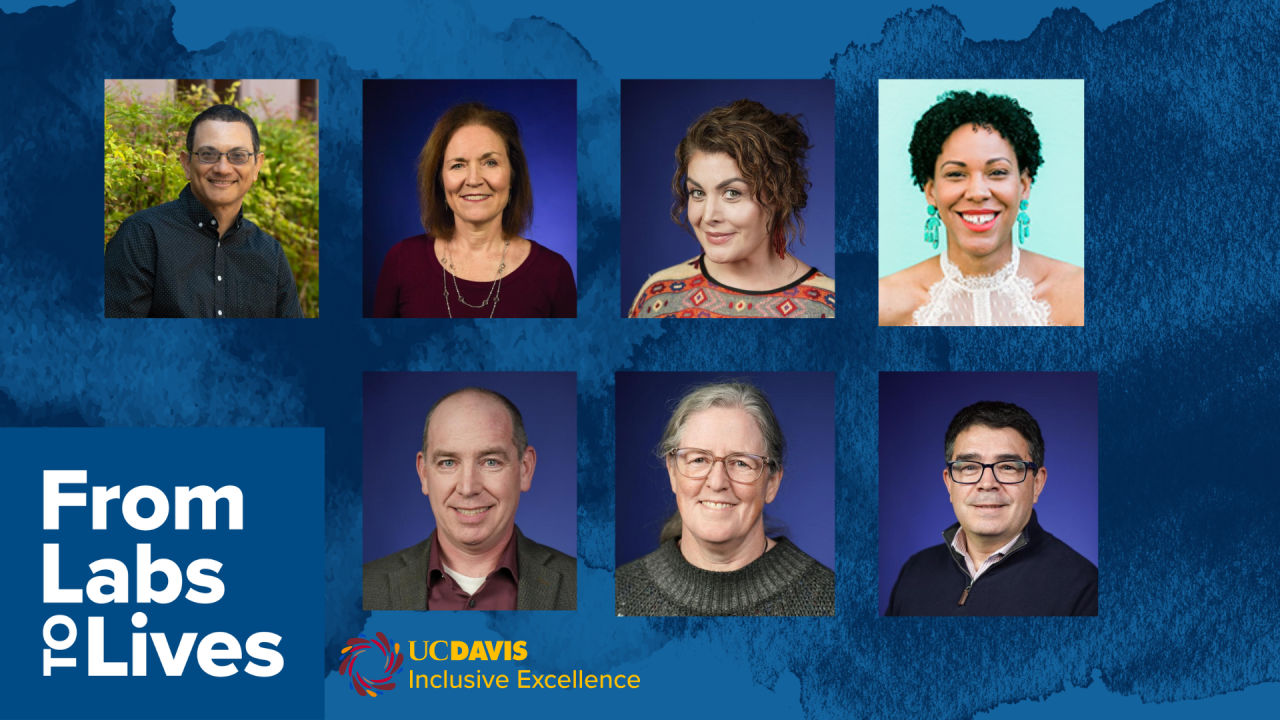
CAMPOS and CAMPSSAH Affiliates Transform Labs to Lives
At UC Davis, we believe in cultivating an environment where faculty can thrive as researchers, mentors, and innovators. Our programs and actions are driven by a shared commitment to expanding knowledge and discovering solutions to some of the world’s most pressing problems. We invest in mentorship and networking that support career advancement, foster policies and practices that create an inclusive campus climate, and conduct research to better understand barriers and catalysts to equity across gender and multicultural perspectives in STEMM.
CAMPOS and CAMPSSAH scholars and affiliates exemplify this commitment. Through federally funded research, they are transforming laboratory discoveries into real-world applications that improve health outcomes, safeguard communities, and strengthen local economies.
Real research. Real people. Real impact.
Federal research funding delivers solutions from UC Davis labs to communities — faster.
Aldrin Gomes, Ph.D.
NIH-Funded Research on How Everyday Medications Impact the Environment
Dr. Aldrin Gomes studies how common medications — like ibuprofen and antibiotics — affect animal and environmental health after entering water and soil systems. His NIH-funded research connects environmental exposure to cardiovascular risks, guiding new approaches to pollution prevention and public health protection.
By highlighting the unseen impact of everyday drugs, Gomes’ work promotes cleaner water, healthier ecosystems, and safer communities. Sustained investment allows science to protect both people and the planet.
Brian Trainor, Ph.D.
NIH-Funded Research on Stress, Social Behavior, and Mental Health
Dr. Brian Trainor examines how chronic stress alters brain function, hormones, and social behavior. His NIH-funded work identifies biological mechanisms behind anxiety, depression, and post-traumatic stress disorder (PTSD), paving the way for new, targeted treatments.
By uncovering how stress disrupts social connection, Trainor’s research offers hope for millions affected by mental health challenges — and provides a scientific foundation for building resilience and recovery.
Dawn Sumner, Ph.D.
NSF- and DOE-Funded Research on Life in Extreme Environments
Dr. Dawn Sumner explores how life and our planet have evolved together over billions of years. Her NSF- and DOE-funded research studies microbial ecosystems in Antarctica’s frozen lakes — places where life survives months of complete darkness.
By uncovering how microbes adapt to extreme conditions, Sumner’s work deepens our understanding of early life on Earth and guides the search for life beyond our planet. Her team’s open-access data also fuels innovation in clean energy, sustainable chemistry, and biomedical discovery.
Continued federal support ensures this high-impact research advances science, strengthens innovation, and creates opportunities for the next generation of scientists.
Leigh Ann Simmons, Ph.D.
USDA-Funded Work to Address Adverse Childhood Experiences in Yolo County
Professor Leigh Ann Simmons leads a USDA-funded initiative to reduce the impact of Adverse Childhood Experiences (ACEs) in Yolo County. Her team connects families to local resources that build resilience, strengthen relationships, and prevent long-term health issues tied to early trauma.
This work directly improves community health — helping children and families overcome adversity and creating stronger, more supportive environments for future generations. Sustained funding keeps these life-changing programs accessible to those who need them most.
Luis Carvajal-Carmona, Ph.D.
NIH-Funded Research to Fight Stomach Cancer with Genetics
Dr. Luis Carvajal-Carmona is uncovering the genetic factors that increase stomach cancer risk, one of the deadliest cancers worldwide. His NIH-funded research enables earlier detection and personalized treatment for patients, especially in underserved communities disproportionately affected by the disease.
His work is giving families access to life-saving screenings and precision medicine approaches that can prevent suffering and improve survival rates. Continued support ensures this research keeps advancing toward cures.
Rebecca Calisi Rodríguez, Ph.D.
NSF-Funded Research on How Stress Affects Parents
Dr. Rebecca Calisi Rodríguez studies how chronic stress changes the brain and affects parenting behavior, using rock doves as a model for understanding human stress. Her research reveals how ongoing stress can alter the brain’s ability to nurture and protect, directly informing public health efforts to support families in high-stress environments.
Her findings help shape strategies that promote parental well-being and healthy child development. Continued NSF support ensures that families most affected by chronic stress benefit from science that helps them thrive.
Theanne Griffith, Ph.D.
NIH-Funded Research on Pain, Sensory Neurons, and Nervous System Health
Dr. Theanne Griffith studies how the nervous system processes sensation to better understand and treat chronic pain and neurological disorders. Her NIH-funded research focuses on how sensory neurons communicate — and how medical treatments, such as chemotherapy, can disrupt this communication and cause painful peripheral neuropathy.
By uncovering how chemotherapy drugs trigger pain, Griffith’s work is helping build a foundation for safer, more effective treatments for cancer patients and others living with neuropathic pain.
